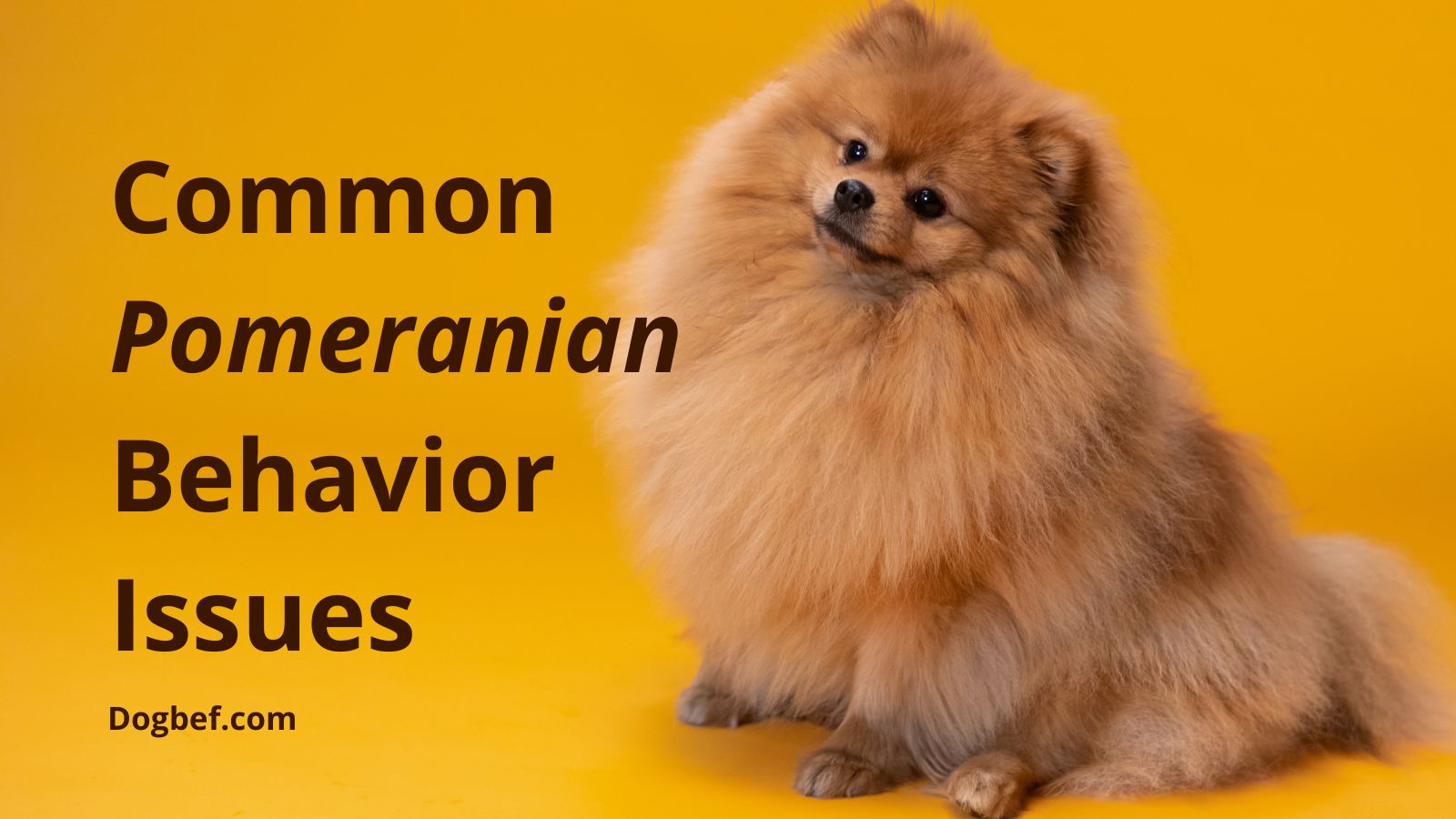Pomeranians are a popular toy breed with a friendly and playful nature, but they can develop behavior problems that owners need to address promptly. In this article, we’ll explore Pomeranian behavior issues, the importance of addressing them, and how understanding these topics can help owners raise happy and well-behaved dogs.
Pomeranians are a toy breed that originated in Germany and Poland. They are small in size, weighing between 3-7 pounds, and have a thick, fluffy coat that comes in various colors. Pomeranians are active and enjoy playing, making them ideal companion dogs due to their friendly and affectionate nature.
Pomeranians can display excessive barking, aggression towards people and other dogs, and destructive behavior due to boredom or anxiety. It’s crucial to identify and address these issues early to ensure the well-being of the dog and the owner’s relationship. Professional trainers and behaviorists can assist owners in learning effective training techniques and developing personalized behavior modification plans to help their Pomeranian overcome these issues.
Understanding Pomeranian Behavior

Understanding Pomeranian behavior is crucial for any owner looking to provide the best possible care for their furry friend. Pomeranians are known for their playful, loyal, and independent personalities. But they can also be stubborn and prone to separation anxiety. By recognizing these traits, you can tailor your care and training to meet your Pomeranian’s unique needs.
Breed history and characteristics
Pomeranians have a fascinating history as sled dogs, which has influenced their characteristics and temperament. Their fluffy double coats require regular grooming, and they are known for their intelligence, curiosity, and affectionate nature. By learning about their breed history and characteristics, you can better understand your Pomeranian’s needs and behavior patterns.
Common Personality Traits
Pomeranians have a unique set of personality traits that make them endearing companions but can also lead to behavior issues if not addressed properly. Their high energy level requires daily exercise and mental stimulation, while their need for social interaction can result in separation anxiety if left alone for too long.
Pomeranians also have an independent streak that requires patience and positive reinforcement training. Understanding their personality traits and providing appropriate care and training can help prevent behavior problems and foster a positive relationship with your Pomeranian.
Communication and body language
Pomeranians communicate through body language, vocalizations, and scent marking. Understanding their communication methods, such as tail and ear positions, can help you determine their mood and intentions. For instance, a wagging tail indicates excitement or happiness, while a tucked tail may indicate fear or anxiety.
Pomeranians also use barking to communicate, and excessive barking can be a sign of anxiety or boredom. By paying attention to their communication and body language, you can better understand your Pomeranian’s needs and address any behavior issues effectively.

What Is the Common Behavior of Pomeranians?
Pomeranians are known for their lively and affectionate personalities. But they can also develop behavior problems if not properly trained and socialized. Understanding the most common behavior issues in Pomeranians can help owners identify and address these problems early on. By recognizing the symptoms, causes, and treatment options for each issue, owners can provide the best care for their furry friend.
1. Separation Anxiety
Separation anxiety in dogs is a common behavioral issue that occurs when they become distressed when separated from their owners. Symptoms may include excessive barking, destructive behavior, inappropriate elimination, pacing, and restlessness.
Treatment options include gradual desensitization to separation, crate training, positive reinforcement, and anti-anxiety medication.
It’s essential to address separation anxiety early on to prevent it from becoming more serious. Seeking the guidance of a professional dog trainer or behaviorist can be extremely helpful in addressing this issue effectively.
Anxiety dogs may help to reduce it. Check out the guide on How calming dog beds work.

2. Aggression
Aggression in Pomeranians is a serious behavior issue that can cause harm to others. Causes include fear, territorial behavior, or lack of socialization. Seek the help of a qualified trainer or behaviorist and address the underlying cause with behavior modification techniques and medication prescribed by a veterinarian.
To address aggression in Pomeranians, always supervise interactions with other animals and people, and avoid situations that may trigger the aggression. Punishment is not an effective approach and may worsen the behavior. Instead, focus on positive reinforcement and consistent training, with the help of a qualified trainer or behaviorist.
3. Fearfulness
Fearfulness in dogs is a common behavioral issue when they become anxious and afraid in certain situations or around certain people or animals. Symptoms may include trembling, hiding, excessive barking, avoidance behavior, and cowering. Fear can be caused by various factors including lack of socialization, negative experiences, or genetics.
Treatment options include gradual desensitization to fearful stimuli, counter-conditioning, positive reinforcement training, and anti-anxiety medication. It’s essential to address fearfulness early on to prevent it from becoming a more serious issue. Seeking the guidance of a professional dog trainer or behaviorist can be extremely helpful in addressing this issue effectively. Proper socialization and training from a young age can also help prevent fear from developing.
4. Excessive barking

Excessive barking in Pomeranian dogs is a common behavioral issue that can be caused by a variety of factors including boredom, anxiety, or territoriality. Symptoms may include barking at every little thing, excessive vocalization, and incessant barking. Treatment options include identifying and addressing the underlying cause of the barking, training with positive reinforcement, and use of deterrents.
It’s important to address excessive barking early on to prevent it from becoming more serious. Seeking the guidance of a professional dog trainer or behaviorist can be helpful in identifying and addressing the underlying cause of the behavior. Proper exercise and mental stimulation can also help reduce excessive barking.
5. Destructive chewing
Destructive chewing in dogs is a common behavioral issue that can be caused by a variety of factors including teething, boredom, anxiety, or lack of proper chew toys. Symptoms may include chewing on furniture, shoes, and other household items.
Treatment options include providing appropriate chew toys, crate training, identifying and addressing the underlying cause, and training with positive reinforcement. It’s important to address destructive chewing early on to prevent it from becoming a more serious issue.
Seeking the guidance of a professional dog trainer or behaviorist can be helpful in identifying and addressing the underlying cause of the behavior. Providing appropriate chew toys and ensuring the dog has enough exercise and mental stimulation can also help reduce destructive chewing.
6. House Training Problems
House training problems can be frustrating for both Pomeranian owners and their dogs. Establishing a consistent routine, rewarding positive behavior, and seeking medical advice if necessary can help address this issue. Destructive behavior, often caused by boredom, separation anxiety, or lack of exercise can also be addressed by providing plenty of mental and physical stimulation and using positive reinforcement training.

How can I prevent my Pomeranian from developing behavior issues?
Pomeranians are a beloved breed that makes great companions, but like any dog, they require proper training and socialization to prevent behavior issues. Here the valuable tips on how to prevent Pomeranian’s behavior issues.
Positive reinforcement
Positive reinforcement is an effective way to train your Pomeranian and prevent behavior issues. Rewarding good behavior with treats, praise, and playtime can help reinforce positive habits and discourage negative ones. Avoid using punishment, which can be counterproductive and cause anxiety or aggression in your dog. Consistency and patience are key to successful positive reinforcement training and help your furry friend. Consider seeking guidance from a professional trainer if you’re having difficulty with training.
Socialization
Socializing your Pomeranian from an early age is crucial to prevent behavior issues. Introduce your dog to different people, animals, and environments in a positive and controlled manner to help them feel comfortable and confident in various situations. Make sure to supervise interactions and reward good behavior to encourage socialization. Seeking professional help from a trainer or behaviorist can also be beneficial in socializing your Pomeranian.

Consistency
Consistency is key when it comes to training your Pomeranian. Use the same commands and rewards every time, and ensure everyone in your household is on the same page. Inconsistency can be confusing to your Pomeranian and slow down the training process.
Patience
Training a Pomeranian can take time and patience, and it’s essential not to get frustrated or angry when your dog doesn’t get it right away. Pomeranians are intelligent but can be stubborn, so be patient, and don’t give up. Break training sessions into shorter periods and always end on a positive note, rewarding your dog for its efforts.
Seeking Professional Help
If your Pomeranian displays severe behavior issues that are beyond your ability to address, it’s important to seek professional help. This can include veterinarians, certified dog trainers, animal behaviorists, or veterinary behaviorists depending on the severity of the behavior issue. During a consultation, expect to answer questions about your Pomeranian’s behavior and work collaboratively with the professional to develop a personalized behavior modification plan.

Conclusion
Pomeranians are intelligent dogs, but like any breed, they can develop behavior problems that require attention. Common Pomeranian behavior issues such as separation anxiety, excessive barking, aggression, house training problems, destructive behavior, fear, and anxiety. It’s essential to understand the breed’s history, characteristics, and communication to prevent and address behavior issues. Positive reinforcement, socialization, consistency, and patience are effective training tips to avoid and correct behavior issues.
Remember, addressing behavior issues in Pomeranians is crucial for both their well-being and yours. Seek professional help if your Pomeranian displays severe behavior issues that you can’t handle on your own. A well-behaved Pomeranian can bring joy and companionship to your life. Ensure that your Pomeranian receives plenty of love, attention, and exercise to maintain their physical and emotional health. By using the right tools and techniques, you can create a happy, healthy, and well-behaved Pomeranian companion for life.
Check out the best dog bed for Pomeranians.
FAQs
Are Pomeranians energetic?
Yes, Pomeranians are known for their energetic nature. As small dogs and toy breeds, they possess a surprising amount of energy. It’s important to provide them with regular exercise and playtime to fulfill their activity needs and prevent behavioral issues.
What are the behavioral issues of Pomeranians?
Pomeranians, like many small and energetic toy breeds, can display certain behavioral issues. Common problems include excessive barking, possessiveness, separation anxiety, and being overly protective.
How do you discipline a Pomeranian dog?
Discipline is essential for Pomeranians, as with any other breed. Use positive reinforcement techniques, establish consistent rules, and provide proper socialization and training from a young age. Avoid harsh punishment, as it can lead to fear and aggression.
How do you calm down a Pomeranian?
Calming down a Pomeranian requires a combination of exercise, mental stimulation, and a structured routine. Engage your energetic pup in regular playtime, provide interactive toys, and establish a peaceful environment to help them relax.
Why is my Pom so aggressive?
Pomeranians can exhibit aggression due to various factors. Lack of socialization, fear, resource guarding, and inadequate leadership can contribute to aggressive behavior. It’s crucial to address the underlying causes and seek professional guidance if needed.
What are Pomeranians weaknesses?
While Pomeranians have numerous strengths, they also have a few weaknesses. Their small size makes them vulnerable to accidental injuries and being stepped on. Additionally, they can be prone to dental issues, luxating patella, and collapsing trachea.
Are Pomeranians prone to anxiety?
Yes, Pomeranians, like many small lap dogs, can be prone to anxiety. They may exhibit signs of nervousness, separation anxiety, or fearfulness. Providing a secure and comforting environment, along with proper socialization, can help alleviate their anxiety.
How do you deal with an aggressive Pomeranian?
Dealing with aggression in a Pomeranian requires professional guidance. It’s crucial to identify the triggers and address the underlying causes. Seek assistance from a qualified dog behaviorist or trainer experienced in handling aggression issues.
Why does my Pomeranian bite me so much?
Pomeranians may resort to biting due to various reasons, such as fear, pain, or lack of boundaries. Identifying the trigger and addressing the root cause is essential. Consult a professional to help you understand and manage your Pomeranian’s biting behavior.
Why does my Pomeranian growl at everyone?
Growling can be a sign of fear, insecurity, or territorial behavior in Pomeranians. It’s important to evaluate the situations in which your Pomeranian growls and seek professional guidance to address any underlying behavioral issues.
Is pomeranian round dog?
Yes, Pomeranians are often described as round dogs. They have a compact and sturdy build with a fluffy coat that gives them a round appearance. Their adorable round faces and fluffy bodies contribute to their distinctive and charming look.
Why is my Pomeranian puppy so hyper?
Pomeranian puppies are often naturally energetic and enthusiastic. As a Pomeranian puppy owner, it’s important to understand that their high energy levels are typical for their breed. Pomeranian puppies have a lot of curiosity and playfulness, which can manifest as hyperactivity. Providing them with regular exercise, mental stimulation, and structured training sessions can help channel their energy in a positive way. Additionally, ensuring that they have a consistent routine, proper socialization, and a calm environment can contribute to managing their hyperactive behavior. Remember, with patience and consistent training, your Pomeranian puppy will gradually learn to control their energy and become a well-behaved companion. Learn about Pomeranian Growth Stages.
What are some effective training techniques for addressing Pomeranian behavior issues?
To prevent and address behavior issues in Pomeranians, effective training techniques can be used. Positive reinforcement training, desensitization and counter-conditioning, and management techniques can all be helpful.
It’s important to be consistent in training and patient with the Pomeranian. Consulting with a professional dog trainer or behaviorist can be helpful in determining the most effective training techniques for a particular Pomeranian.
What should I do if my Pomeranian is exhibiting signs of separation anxiety?
Separation anxiety is a common issue in Pomeranians and can be distressing for both the dog and the owner. To help your Pomeranian overcome separation anxiety, start by gradually increasing the length of time you leave them alone, provide plenty of exercises and mental stimulation, and create a safe and comforting space for them.
Calming aids, such as pheromone sprays, music, or a ThunderShirt, can also be useful. It’s important to remain patient and consistent throughout the training process and seek professional help if the anxiety persists. By taking these steps, you can help your Pomeranian feel more comfortable and secure when left alone.
Can aggressive behavior in Pomeranians be corrected?
Yes, aggressive behavior in Pomeranians can be corrected with positive reinforcement training, desensitization, counter-conditioning, and management techniques.
Consistency and patience are important throughout the training process, and consulting with a professional trainer or behaviorist may be necessary.
Managing the dog’s environment can help prevent aggressive behavior from occurring. Pomeranian owners can help their dogs overcome aggressive behavior and become well-behaved companions.
How can I stop my Pomeranian from excessive barking?
Excessive barking is a common behavior issue in Pomeranians, but it can be addressed with several techniques. The first step is to identify the trigger that causes your Pomeranian to bark excessively.
Positive reinforcement training can be used to teach your dog to stop barking on command and reward them when they do so. Providing enough exercise and mental stimulation can also help reduce barking.
Creating a calm environment and seeking professional help if necessary are other strategies to help stop excessive barking. By being consistent and patient, you can help your Pomeranian become a quieter and better-behaved companion.
What are some causes of destructive behavior in Pomeranians?
Destructive behavior in Pomeranians can be caused by various factors, including boredom, separation anxiety, lack of training, medical issues, and teething. It’s essential to identify the cause of the destructive behavior to address it appropriately.
Providing adequate exercise and mental stimulation, training, and creating a safe environment can all help prevent destructive behavior. Moreover, seeking veterinary care can help identify any underlying medical issues that may contribute to destructive behavior.
By addressing the cause and implementing the appropriate measures, owners can help their Pomeranians become well-behaved and happy companions.
When should I seek professional help for my Pomeranian behavior issues?
When your Pomeranian’s behavior issues become persistent or dangerous, seeking professional help is crucial. A professional can identify the underlying cause of the behavior problems and provide guidance on how to address them effectively.
Signs that it’s time to seek professional help for your Pomeranian include aggression, fear and anxiety, destructive behavior, excessive barking, and litter box issues. These behavior issues can be challenging to manage without professional guidance, and seeking help can prevent further escalation of the problem.
In summary, seeking professional help for your Pomeranian’s behavior issues is essential to ensure their safety and happiness, and it’s important to seek help as soon as you notice persistent or dangerous behavior.








